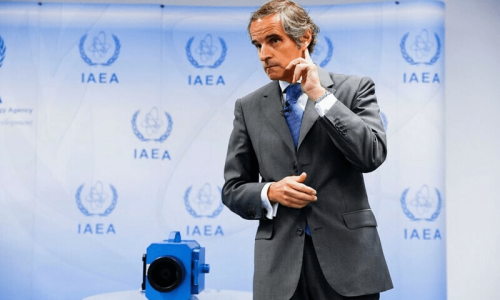ISLAMABAD, April 28: The new government told the Senate on Monday it would continue anti-terrorism cooperation with the United States because “it is in our national interest” but would not compromise on national sovereignty by allowing foreign troops to operate inside its borders.
Foreign Minister Shah Mahmood Qureshi, who was responding to objections raised by two opposition senators mainly against remarks by US Deputy Secretary of State John Negroponte about the possibility of US troops pursuing Osama bin Laden inside Pakistan border area in the event of an explicit proof of his presence there, said only Pakistani troops could operate inside the country’s borders and American and Nato troops on the Afghan side.
However, he said, ‘some encroachments’ did occur at times because of the close proximity of military posts along the border and it was the job of a military tripartite commission of American, Pakistani and Afghan representatives to minimise such incidents.
Judges issue
The minister’s first foreign policy statement in the Senate came after the Leader of the House, Mian Raza Rabbabi, assured the upper house that the coalition was committed to last month’s Murree Declaration signed by leaders of the main coalition parties for the reinstatement of about 60 judges of the superior courts and rejected opposition charges of political victimisation by the new government.
Jamaat-i-Islami parliamentary leader Prof Khurshid Ahmed rose on a point of order to complain about Mr Negroponte’s comments at the weekend and some local newspaper reports suggesting that foreign ministry secretary Riaz Mohammad Khan had been relieved of his post in “indecent haste”.
But Mrs Razina Alam of the Pakistan Muslim League-Q wanted the government’s response to the American official’s interview.
Mr Qureshi said Pakistan was cooperating in the war against terrorism not at the behest of America but because “our own country is … in the grip of terrorism” that damaged its image and hit investments.
“Therefore, we thought to pursue (this cooperation with the United States) in our larger national interests,” he said, adding there was no harm if the interests of the two sides coincided.
“Pakistan’s policy is clear that no outside forces can operate inside our borders. Only Pakistani military has this right, no other force.”
Mr Qureshi said: “We will not compromise on Pakistan’s sovereignty and the Americans understand the sensitivities involved … and they will do nothing that undermines the basis of this cooperation.”
‘Wise diplomat’
The foreign minister said that foreign secretary Khan had been relieved of a contract employment given by the previous government according to the official’s own wishes and that he had personally told him to stay on for the time being because the new government was in no hurry.
He praised the retired secretary as a “very capable and wise diplomat” who, he said, would continue in office until Pakistan’s ambassador in China, appointed as his successor in consultation with him, joined the ministry.
Mr Raza Rabbani, winding up the lengthy debate on the post-election scenario, said the ruling coalition would implement the Murree Declaration because it did not recognise what he called an unconstitutional Provisional Constitution Order under which judges had been deposed.
He said the coalition would also end ‘disbalance’ of powers created by Article 85 (2) (b) of the Constitution that empowered the president to sack a prime minister and dissolve the National Assembly. Referring to the opposition’s attempt to take credit for forming a parliamentary committee on Balochistan under the previous government, Mr Rabbani said the government’s inaction on any of the recommendations of a sub-committee to remove Baloch grievances and incidents like the murder of Nawab Akbar Bugti and disappearances and detentions of activists had led to a boycott by Baloch nationalist parties and then by the entire opposition.
He also rejected the opposition’s complaint about the talk of figure-fudging of the previous government about the country’s state of economy and said these figures should actually be brought before the standing committees of parliament where the former prime minister Shaukat Aziz should be called to explain his position.
Mr Rabbani said the ruling coalition had nothing to do with incidents like the roughing up of Arbab Ghulam Rahim and Sher Afgan Niazi because both incidents had happened when the caretaker government was in office.
Citing numerous cases of killings of opposition activists under the previous government, he said the two sides should forget the past and cooperate with each other to ensure the supremacy of the Constitution and parliament.
Opposition leader Kamil Ali Agha had complained about what he called unbecoming attitudes of election victors and even blamed the new government for the prevailing economic hardships like price hike.
But, he said, the opposition would cooperate with the government in “good policies” and “good legislation” but would “stand like an impregnable wall” if it betrayed the people.
Earlier, Mr Agha had a heated exchange with PPP’s Senator Enver Baig who presented in the house what he called lists issued by some banks in 2005 about loan defaults by politicians and industrialists amounting to several billions of rupees and complained that no attempt was being made to recover these huge loans while a citizen of Karachi had committed suicide on Sunday after being unable to repay a small loan.
Finance Minister Ishaq Dar told the house on the complaint of MQM’s Ahmad Ali and Mr Agha that he had asked the State Bank to inquire about the alleged harassment of a bank’s staff that forced the man to commit suicide and also sought action by the Sindh police chief through the provincial home secretary.










































Dear visitor, the comments section is undergoing an overhaul and will return soon.